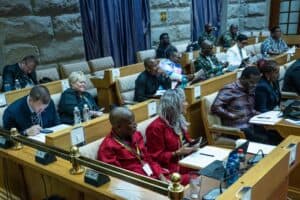Every citizen donated R25,000 to looters in five years.

The numbers are difficult to comprehend they are so staggering – more than R1.5 trillion looted in corruption between 2014 and 2019 alone – but when you look at them in real terms, the pain of what we have lost as a country is clear.
Similar to The Economist’s way of calculating the buying power of various currencies by using the cost of a McDonald’s Big Mac burger, we have analysed that looted amount – calculated by the Unite 4 Mzansi’s first case study, State Capture 101, released this year.
That stolen R1.5 trillion could have:
- Provided every South African with a R33 McDonald’s Big Mac hamburger every day for two years.
- Given each one of our 25 million unemployed people a job at the R3 500 a month minimum wage for 18 months as a kick-start in life.
- Bought 600 000 BMW X5s – the vehicles so beloved by the occupants of the blue light convoys.
- Purchased the entire stock of Naspers, Africa’s biggest communications conglomerate.
- Built 6 000 Nkandla homesteads, including “firepools” and special cattle kraals with their price tag of R247 million each.
- Built a huge chunk of President Cyril Ramaphosa’s smart city.
- Built high-speed bullet train railway lines between the main centres.
The R1.5 trillion is more than the entire national budget for this financial year, which stands at R1.35 trillion.
It also means, effectively, that every single South African citizen donated R25,000 to the looters. Working with an interest rate of 10% per annum, that looted amount would generate R150 billion a year in interest.
Economist Dawie Roodt said every rand stolen through corruption by default hurts South Africa more than the same amount stolen in, for example, the US.
“Since the rand is worth more locally than internationally, measuring the R1.5 trillion in corruption to the exchange rate in foreign currency does not give an accurate picture,” he said.
“That is because it can buy more locally than internationally. This means the true impact of corruption is felt deeper in South Africa than it may have been in another country.
“The most important thing is that, in the end, prosperity of a nation can be measured in life expectancy.”
In South Africa, it has dropped by roughly three years from 62.4 for men and 68.4 for women in 1994, to 59.3 and 64.6 for men and women respectively in 2021.
“As the ruling party is helping itself to our money, it’s also digging into citizen’s life expectancy,” said Roodt.
“And the problem is not only corruption, but incompetence. You cannot populate key roles in government or in the economy with cadres. Success needs people who know how to do the job, not political insertions kowtowing to the sticky fingers of their masters.”
South Africa’s foreign debt stands at close to R4 trillion. Not only are taxpayers paying back that money, but also funding the interest on this debt. At this rate, SA will be spending more on debt interest than it does on education.
Interest
The R150 billion a year in interest alone could:
- Have built 10 000 simple schools at an average of R15 million per school this year and funded teachers’ salaries from a small chunk of next year’s interest payments.
- Be equivalent to the entire gross domestic product of the Indian Ocean island nation of Mauritius.
- Be equivalent to the net worth of 30 Beyoncés (who is worth an estimated R5 billion)
- Be more than the value of SA’s gold reserves of 125 tons, valued at the current market price of R105 billion.
- SA could have vaccinated the entire population against Covid with two shots, at roughly R600. It would have a R36 billion price tag and R114 billion change using a single year’s repayment.






